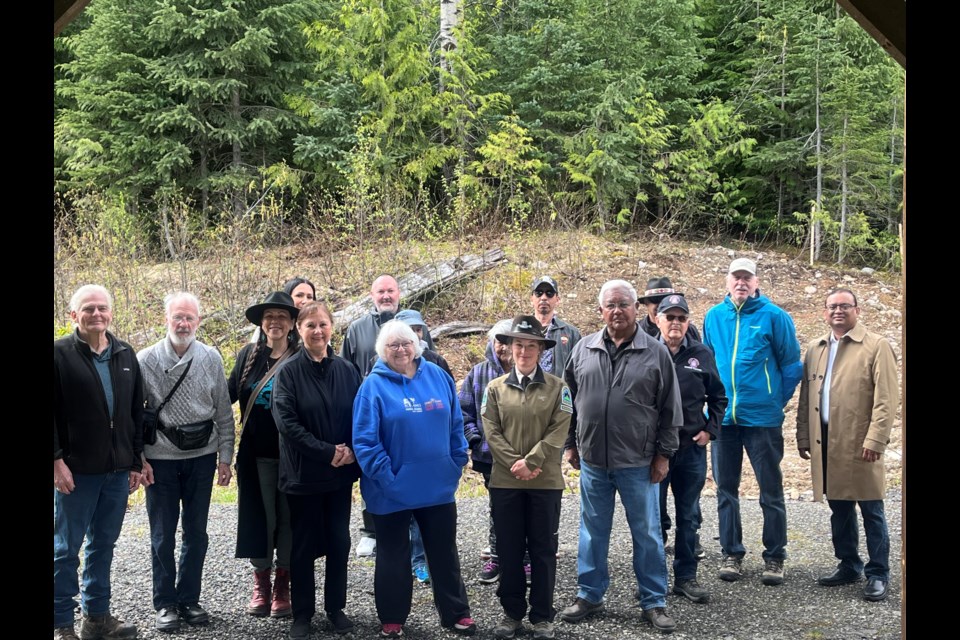Lheidli T’enneh First Nation, BC Parks, the BC government and numerous community partners officially broke ground Tuesday, May 20 on the Ancient Forest Enhancement Project (AFEP).
The initiative aims to enhance the visitor experience, preserve the forest’s ecosystem and provide cultural education to people from across the province.
Elders and members of the Lheidli T’enneh, along with representatives from BC Parks, construction and design leads and project workers, attended the groundbreaking ceremony at the site east of Prince George and spoke about the project’s goals and their hopes for its completion.
The new interpretive centre will include space for visitors to learn about the cultural, historical and ecological significance of the forest. It will also feature educational displays showcasing local flora and fauna, traditional knowledge, and the conservation history of the area.
“It’s going to have Lheidli T’enneh culture,” said Lheidli T'enneh Coun. Crystal Gibbs. “We’ll have local artists displaying and selling their work, and a visiting space where our Elders can come together. The project has finally come to light, and just to see where it’s going — to bring in tourism — I think it’s a beautiful, amazing space. Just look around, it’s incredible.”
Plans for the facility include an Indigenous gift shop and accommodations for overnight stays. Notably, the interpretive centre will be 100 per cent off-grid, relying entirely on solar power.
“Today’s project is a meaningful step forward in realizing the intent of the partnership and advancing reconciliation in tangible and lasting ways,” said Edward Hoffman, executive director for BC Parks' North Area. “The new interpretive centre, along with cultural spaces and boardwalk improvements, will enhance the visitor experience while sharing the stories, voices and values of the Lheidli T’enneh. It will be a space to learn, connect and reflect — celebrating both Indigenous knowledge and the important conservation legacy of this forest."
Boardwalk improvements will provide visitors with expanded access to the forest while protecting sensitive ecosystems. A new waterfall viewing platform is also in development.
“The project is truly coming to life today with financial support from both the federal and provincial governments. We look forward to seeing it become a pillar of Indigenous tourism and cultural education in northern BC, as well as a model for effective collaboration within our protected areas," Hoffman said.
Juno-nominated Indigenous artist Kym Gouchie, who also attended the ceremony, shared her excitement and personal connection to the work.
“I’ve been part of the Ancient Forest Working Group since its inception,” Gouchie said. “I’ve witnessed all the growth and changes. To be here today and see the groundbreaking — it made my heart jump a little. It honours not just those involved in the project and those we’ve lost along the way, but also our ancestors. This project gives our community a voice on a global level.”
Gouchie emphasized how the project is building stronger relationships.
“Our community of Lheidli T’enneh has been displaced from the city to the north and south sides of Shelley, out to Miworth, and west of Prince George,” she said. “It’s felt like an ‘us and them’ situation for a long time. Events like this, just like the Canada Winter Games, bring us together. The many stakeholders involved, including the Caledonia Ramblers, BC Parks, the city and others, are helping us understand each other and build relationships. I think the forest and this project have really done that.”
The AFEP is funded through the Investing in Canada Infrastructure Program's Community, Culture and Recreation stream, with a total estimated cost of $8.7 million. Ninety per cent of the funding comes from the federal and provincial governments, with the remaining 10 per cent contributed by the Lheidli T’enneh First Nation.
Originally scheduled for completion in March 2025, the project has been delayed due to the COVID-19 pandemic and the passing of the project manager. It is now expected to be completed by March 2027.
Sultanur Ashikin, infrastructure and housing manager for the Lheidli T’enneh First Nation, said the project remains financially and logistically viable, despite challenges.
“The project was initially priced at $8.7 million, but we’re now looking at about $11 million,” Ashikin said. “Lheidli T’enneh is contributing 10 per cent, with the rest coming from the province and Ottawa. We’ve already spent about $700,000 on design and development.
“There’s currently a $3-million shortfall. That’s on us for now. We’re actively seeking grants and recently secured $200,000 from the Northern Development Initiative Trust. We’re confident we’ll meet the funding goal.”
Ashikin said the team is in discussions with Tourism Prince George to potentially join the project as a partner, and is also pursuing additional funding —particularly for the solar component — through an energy efficiency grant.
The nature of the project has created some logistical challenges, particularly with construction.
“The boardwalk portion is completely unique compared to the usual work we do,” Ashikin said. “When we tendered it in 2023, we didn’t get any bids. Part of the issue was that no heavy equipment or excavators are allowed in the forest, which made it too difficult for many contractors.
“So we worked with PRD Construction and our design team to revise the RFP to make the work more accessible. As for the building, because it’s fully off-grid, we had to design it to be as energy-efficient as possible, to ensure it can run reliably on solar year-round.”
Ashikin acknowledged that maintaining the interpretive centre may present difficulties due to its location and power system but expressed confidence these challenges can be managed.


